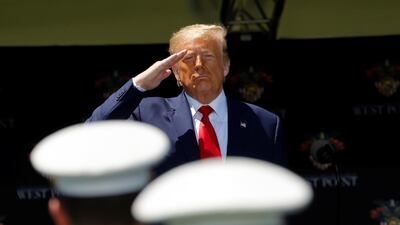Donald Trump has postponed a controversial rally scheduled for the same day as a holiday commemorating the end of slavery, and used a speech to the country's graduating army cadets to highlight diversity.
He was heavily criticised for plans to have an election rally on the June 19 ‘Juneteenth’ holiday, in a city infamous for a massacre of African Americans, while anti-racism protests sweep the country following the death of George Floyd in police custody.
On Saturday he addressed officers graduating from West Point military academy.
“What has historically made America unique is the durability of its institutions against the passions and prejudices of the moment. When times are turbulent, when the road is rough, what matters most is that which is permanent, timeless, enduring and eternal," he said.
He said West Point “gave us the men and women who fought and won a bloody war to extinguish the evil of slavery within one lifetime of our founding".
His now-cancelled "Make America Great Again" rally in Tulsa, Oklahoma had been due to mark Trump's return to the campaign trail, but he said on Twitter the event had been postponed "out of respect" for the June 19 ‘Juneteenth’ holiday.
"This isn't just a wink to white supremacists-he's throwing them a welcome home party," Senator Kamala Harris tweeted after Trump first announced the rally.
The Republican billionaire announced on Wednesday that he would resume his campaign rallies in four states, Oklahoma, Florida, Arizona and North Carolina, despite the coronavirus pandemic that continues to rage in the US. The postponed event will now be held on June 20.
“Many of my African American friends and supporters have reached out to suggest that we consider changing the date out of respect for this holiday, and in observance of this important occasion and all that it represents, Mr Trump tweeted about the postponement.
“I have therefore decided to move our rally to Saturday, June 20th, in order to honour their requests.”
The postponement and accusations of insensitivity came as tensions between Mr Trump and the military continued to bubble since nationwide protests began over the death of Floyd, a black man who was pinned by the neck by a white police officer for several minutes despite saying he couldn’t breathe.
The West Point military academy students were sent home in March as coronavirus took hold of the country and states began to shut down.
When Mr Trump revealed he was still interested in making the commencement address, the class of 2020 was instructed to return to the academy, 50 miles north of New York City, to undertake two weeks of lockdown before the ceremony.
“The members of this class have come from every state in our union. You have come from the farms and the cities, from states big and small, and from every race, religion, color, and creed. But when you entered these grounds, you became part of one team, one family, proudly serving one great American nation," Trump said on Saturday.
The graduates, 1,100 Army second lieutenants, were tested for the virus on arrival at the camp and 15 tested positive, Lt Col Christopher Ophardt, a West Point spokesman, told the New York Times.
The 15 did not transmit the virus to anyone else and have recovered and will attend the ceremony, he added.
In the past two weeks, Mr Trump admonished Defense Secretary Mark Esper for publicly opposing his call to use active-duty troops to crack down on the demonstrations. Mr Trump then shut down Mr Esper’s attempt to open a public debate on removing the names of Confederate Army officers from military bases.
Gen Mark Milley, the Joint Chiefs of Staff chairman, further risked Trump’s ire Thursday by declaring it had been “a mistake” for him to accompany Trump on a June 1 walk through Lafayette Square. The trip ended with the president holding up a Bible and posing for the news media outside St John’s Church, which was damaged by fire during the unrest.
Gen Milley’s comments amounted to an extraordinary expression of regret by Trump’s chief military adviser, who said his appearance led to the perception of the military becoming embroiled in politics, which in his view — one shared by Esper — is a threat to democracy.
Raucous rallies have been a hallmark of Trump's presidency and a key to energising his base, which he hopes will turn out in big numbers on November 3. He is currently lagging in the polls against Democrat Joe Biden.
Job approval for the president is also down after his response to the coronavirus pandemic and the recent turmoil over police brutality, sparked by Floyd's death during his arrest in Minneapolis.
Former advisers are also having their say on the president's actions. Publisher Simon and Schuster announced Friday that former National Security Adviser
John Bolton will release a book detailing impeachable offences committed by Mr Trump.
Mr Trump earlier this year warned Mr Bolton not to publish his book while the president is still in the White House, whose lawyers have contended that large portions of the material in the memoir are classified.











